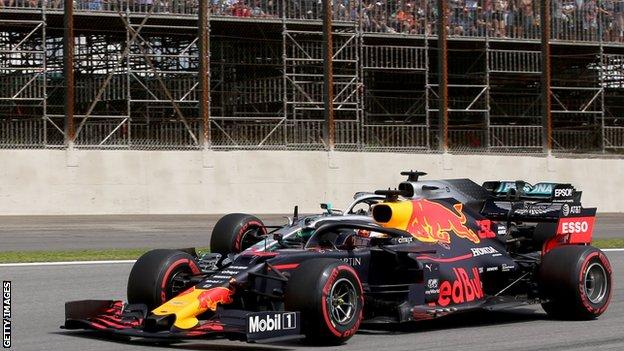

Formula 1 drivers have been given new driving standards guidelines before the 2022 season.
The move is part of the series of changes governing body the FIA has made to try to learn the lessons from the mistakes made last year.
The new guidelines outline the ways in which drivers overtaking and being overtaken must behave while fighting.
The onus is on drivers to take responsibility for matters such as gaining advantage by leaving the track.
This is a significant shift away from the manner in which former FIA race director Michael Masi personally intervened to tell drivers who had gone off track and gained a position to return it, and is likely to lead to more penalties.
Racing ethics became a major issue throughout 2021, especially in the context of Max Verstappen’s aggressive racing tactics.
The new rules lay out guidelines for manoeuvres where cars are overtaking both on the inside and outside.
The guidelines have not been published beyond the teams, but they have been seen by BBC Sport.
The new guidelines dictate that a driver being overtaken must give “sufficient room to an overtaking car” if “a significant portion” is alongside.
The overtaking manoeuvre must be done “in a safe and controlled manner, while enabling the car to remain within the limits of the track”.
The rules do not explicitly define what “a significant portion” of a car means, but they say that “among the various factors that will be looked at by the stewards… they will consider if the overtaking car’s front tyres are alongside the other car by no later than the apex of the corner”.
The same rules apply for overtaking on the outside. The FIA says that the requirement for a driver being overtaken to give “sufficient room” becomes active when “a significant portion” of the attacking car is alongside, with the same requirement for the manoeuvre to be safe and controlled.
The definition of “significant portion” again remains not precise but it does define that one factor considered will be “if the overtaking car is ahead of the other car from the apex of the corner”.
It adds: “The car being overtaken must be capable of making the corner while remaining within the limits of the track.”
This rule would have guaranteed a penalty for Verstappen in his infamous fight with Lewis Hamilton at Turn Four in Brazil last year.

Drivers were reminded of the rule that dictates no car may “be driven unnecessarily slowly, erratically or in a manner which could be deemed potentially dangerous to other drivers or any other person”.
Unfortunately, the document sent out by the the FIA refers to the wrong number of article in the sporting regulations – it indicates the number this clause had last year – 27.4 – not the number it has this year, which is 33.4.
The document was sent out to teams only at the Bahrain Grand Prix, and it does not refer directly to the stipulations in the sporting code to do with dangerous driving.
This says: “More than one change of direction to defend a position is not permitted.
“Any driver moving back towards the racing line, having earlier defended his position off-line, should leave at least one car width between his own car and the edge of the track on the approach to the corner.
“However, manoeuvres liable to hinder other drivers, such as deliberate crowding of a car beyond the edge of the track or any other abnormal change of direction, are strictly prohibited. Any driver who appears guilty of any of the above offences will be reported to the stewards.”
The new guidelines dictate: “If a driver, for example, short-cuts a chicane or a corner, it is his or her responsibility to clearly give back the advantage he or she gained. This may include giving back the timing advantage up to drop back a position behind the relevant driver.”
Insiders believe this refusal of race control to directly intervene quickly in such incidents is likely to lead to more penalties as the competitive nature of drivers and teams may well mean they are reluctant to take action themselves. – bbc.com